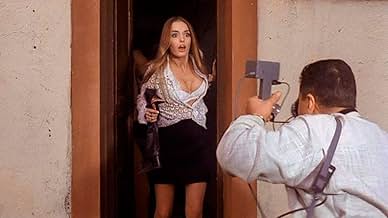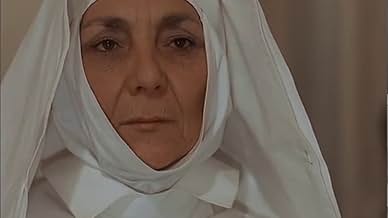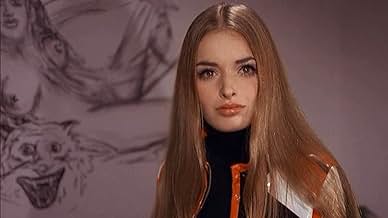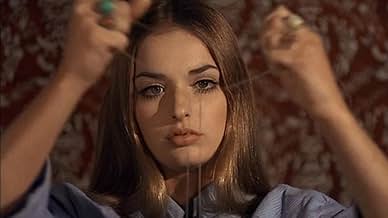Ajouter une intrigue dans votre langueShortly after her release from a mental hospital, a young woman begins a campaign of revenge against those who placed her there.Shortly after her release from a mental hospital, a young woman begins a campaign of revenge against those who placed her there.Shortly after her release from a mental hospital, a young woman begins a campaign of revenge against those who placed her there.
Adrienne Larussa
- Licia
- (as Adrienne La Russa)
Alba Maiolini
- Nun
- (non crédité)
Histoire
Le saviez-vous
- AnecdotesAfter an introductory section the English version casts the titles over Mario and Licia, cavorting with a camera, to a sing-songy nursery rhyme "Daddy, What is true?", a whiny complaint about Licia's daddy issues, which is then heard, insistently, ad nauseum, as the musical theme throughout the score. The Italian version, "Salvare la faccia," cuts the introductory scenes and opens with Mario and Licia, nude under the credits, kissing and caressing in close up, over an entirely different theme, "Love Your Neighbor as Yourself," which repeatedly repeats the aforesaid aphorism, followed, repeatedly, by the line "Kill them, alright! Kill them, alright!"
- GaffesWhen Licia arrives looking for Giovanna, her hair is up under a beret. Cut to her 2 sec. POV survey of the empty room, cut back to her, with her hair all combed out, and beret nowhere to be found.
- Citations
Vocalist over opening credits: From my childhood I can't borrow. All I see is tears and sorrow. Yesterday, but no tomorrow. Daddy, what is true?
- Versions alternativesAfter an introductory section the English version casts the titles over Mario and Licia, cavorting with a camera, to a sing-songy nursery rhyme "Daddy, What is true?", a whiny complaint about Licia's daddy issues, which is then heard, insistently, ad nauseum, as the musical theme throughout the score. The Italian version, "Salvare la faccia," cuts the introductory scenes and opens with Mario and Licia, nude under the credits, kissing and caressing in close up, over an entirely different theme, "Love Your Neighbor as Yourself," which repeatedly repeats the aforesaid aphorism, followed, repeatedly, by the line "Kill them, alright! Kill them, alright!"
- Bandes originalesDaddy, What is True?
by Benedetto Ghiglia, lyrics by Jo Anna Kneeland
Commentaire à la une
More psychological style giallo here, but still interesting, as usual involving the corrupt and over privileged.
Young, daft Licia is talked into going to a whorehouse to have sex with her boyfriend Mario, not knowing that Mario merely intends to use the situation to blackmail Licia's dad, a rich business magnate with many ties to the Church and the local community. Her dad responds by declaring that Licia did what she did because she was nuts, and has her thrown in a loony bin. Licia for some reason doesn't take this too well, and hell mend everyone involved when she gets out...
Licia casts her net wide when picking potential victims, but then again there are many folk in her life that are corrupt and more immoral than they made her out to be. Her father after all is having an affair with his business partner's wife, who is basically scheming to have her husband put into some political position of power. Her own sister has only been married to her husband for business purposes, and he seems to have the hots for Licia, as you do when your sister in law starts parading around the place half naked in front of you. Mario the blackmailer doesn't escape too easy either, and finds himself a pawn in Licia's game.
The best thing about the film is Adrienne Larussa as Licia. She seems to try to blend back into society once released but quickly finds she can't. She also becomes really happy when she decides that she's just going to destroy everyone instead, leading to many scenes where the characters are injured or confused by Licia's antics, including her splicing images of her father's affairs into a business pitch, and giving a non-fatal electrocution to her sister.
This is still old school giallo however, so don't expect and excess of blood and gore. There is a freak out dancing scene involving Licia and her dad's assistant that's pretty funny though, plus a terrible song at the beginning. This film involves mind games, blackmail, that sort of thing, but shouldn't be overlooked. If you like Adrienne Larussa you'll love this, because the camera lingers over her most of the time.
Young, daft Licia is talked into going to a whorehouse to have sex with her boyfriend Mario, not knowing that Mario merely intends to use the situation to blackmail Licia's dad, a rich business magnate with many ties to the Church and the local community. Her dad responds by declaring that Licia did what she did because she was nuts, and has her thrown in a loony bin. Licia for some reason doesn't take this too well, and hell mend everyone involved when she gets out...
Licia casts her net wide when picking potential victims, but then again there are many folk in her life that are corrupt and more immoral than they made her out to be. Her father after all is having an affair with his business partner's wife, who is basically scheming to have her husband put into some political position of power. Her own sister has only been married to her husband for business purposes, and he seems to have the hots for Licia, as you do when your sister in law starts parading around the place half naked in front of you. Mario the blackmailer doesn't escape too easy either, and finds himself a pawn in Licia's game.
The best thing about the film is Adrienne Larussa as Licia. She seems to try to blend back into society once released but quickly finds she can't. She also becomes really happy when she decides that she's just going to destroy everyone instead, leading to many scenes where the characters are injured or confused by Licia's antics, including her splicing images of her father's affairs into a business pitch, and giving a non-fatal electrocution to her sister.
This is still old school giallo however, so don't expect and excess of blood and gore. There is a freak out dancing scene involving Licia and her dad's assistant that's pretty funny though, plus a terrible song at the beginning. This film involves mind games, blackmail, that sort of thing, but shouldn't be overlooked. If you like Adrienne Larussa you'll love this, because the camera lingers over her most of the time.
Meilleurs choix
Connectez-vous pour évaluer et suivre la liste de favoris afin de recevoir des recommandations personnalisées
- How long is Psychout for Murder?Alimenté par Alexa
Détails
- Durée1 heure 28 minutes
- Mixage
Contribuer à cette page
Suggérer une modification ou ajouter du contenu manquant

Lacune principale
By what name was La scandaleuse (1969) officially released in Canada in English?
Répondre

























